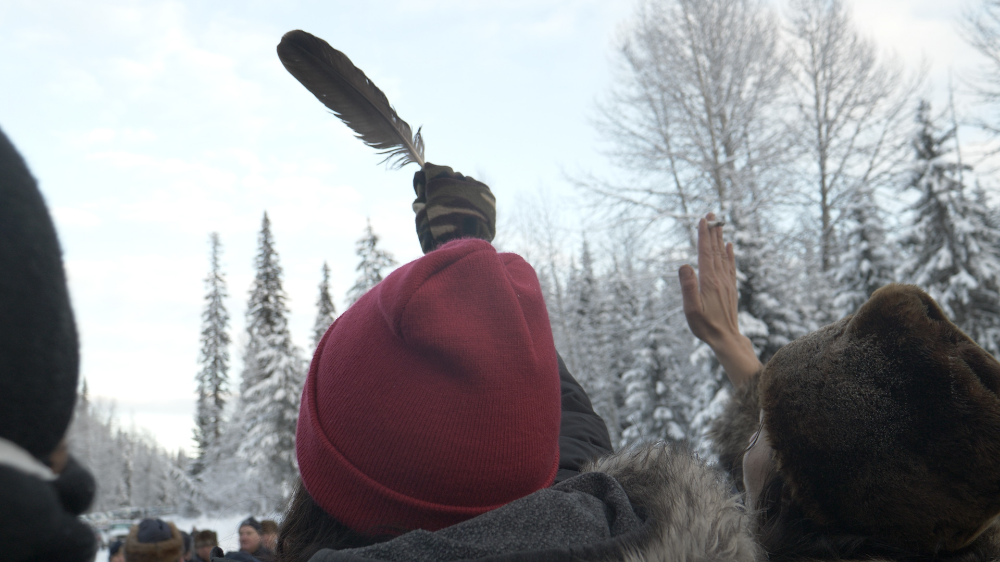A debate is raging across Canada about whether the RCMP committed an injustice against the Wet’suwet’en peoples by going into their Unist’ot’en camp in northern British Columbia, arresting 14 people and demolishing structures.
The Wet’suwet’en were defending their land against the development of the Coastal GasLink natural gas pipeline.
The people defending the land comprise Wet’suwet’en hereditary chiefs and their people, who want to ensure that their lands are protected so they can continue to practise their rights to hunting, fishing, trapping and gathering, and exercise their right to clean air and water and a healthy environment. Pipelines, they say, are a threat to these rights that the Wet’suwet’en people value.
Neither the elected chief and band councils that support the pipeline, nor the federal or provincial governments, nor Coastal GasLink ever obtained the consent of the Wet’suwet’en hereditary chiefs and their supporters. And that’s what’s at issue here.
As with most lands in British Columbia, aboriginal title exists on the Wet’suwet’en lands in question. And based on this title, they have the right to defend their lands from development that will adversely affect them. The Wet’suwet’en were never defeated in a war, never surrendered their lands and never entered into a treaty.
Aboriginal title in B.C. remains largely unresolved, with the exception of the five per cent of the Tsilhqot’in lands declared by the court to be their lands and some areas with treaties. Their unceded territories include the land, water and natural resources.
The authority for the land lies with the hereditary chiefs, as opposed to the elected chief and councils, which have never been given jurisdiction to deal with the land. These chiefs and councils are elected under the Indian Act, a federal law that’s been in place since 1868. It provides how and when elections are held and what powers chief and councils have on reserve lands.
The Indian Act was aimed at destroying traditional forms of governance, as traditional forms did not include elections and were not democratic in the eyes of the federal government. Most councils work beyond their limited powers in the Indian Act, including consultation on lands and resources in their territory, and have never been asked if they have the power.
The Wet’suwet’en have their own governance system, which includes their own laws, implemented by the hereditary chiefs that allow them to use, control, occupy and benefit from any of their lands and to defend their lands when necessary.
One of the stated goals of both the federal and provincial governments is to decolonize the laws and structures within Canada. Decolonizing means to respect the forms of governments established by First Nations that have been in place since time immemorial, and not just the colonial law called the Indian Act. This means that the hereditary chief system of the Wet’suwet’en must be respected and upheld.
Whether the hereditary system is respected or not, the elected chief and council should have gone to the members, including the hereditary chiefs, to get their consent before signing any agreements with a resource company.
Rights are held collectively by all members, as established in the Sparrow Case and the Tsilhqot’in case. The Tsilhqot’in case specifically says that aboriginal title is a collective right of the people and must not be used so as to deprive the benefit from future generations.
What about international law?
When one looks at the legalities of the conduct of the Wet’suwet’en, one has to look at international law. Both federal and provincial governments have committed to implementing the United Nations Declaration on the Rights of Indigenous Peoples. Article 10 of that declaration states that Indigenous peoples should not be forcibly removed from the lands in their territories. The RCMP removing the Wet’suwet’en obviously was a forced removal and in contravention of UNDRIP.
Article 26 is one of the more important ones in the declaration. This article states that Indigenous people have the right to the lands, territories and resources they have traditionally owned. It also says that states shall give legal recognition and protection to these lands, territories and resources. Let’s face it; if Wet’suwet’en lands had been recognized and given legal protection, there would not be this kind of dispute in the public eye. Another deficiency in Crown actions.
Article 32 requires states to obtain the free and informed consent of Indigenous peoples prior to the approval of any project affecting their lands or territories and other resources. Clearly no such consent was obtained.
Article 18 talks of the right of Indigenous peoples to participate in decision-making in matters that would affect their rights, in accordance with their own procedures. Again, this did not happen.
In proceeding to issue permits and licenses on the pipeline project, the governments did not ensure that the free, prior and informed consent of the peoples was given to the elected chief and council. They just accepted the elected chief and council agreement. This also runs contrary to many of the articles in UNDRIP.
Contrast Wet’suwet’en title and international law with a B.C. Supreme Court injunction issued without looking at title or international law, based on permits or licences to develop a project.
The core issues before the court did not even address the legal footing of the Wet’suwet’en. Who had the law on their side?
Public opinion on who is right and who is wrong continues to rage on social media and in the news. Inquiring minds want to understand why the Wet’suwet’en want to stop the development of the pipeline. They want to understand the differences between hereditary and Indian Act elected chiefs and council. Once you have answers to these questions, you can decide if this was an injustice.
These kinds of high-profile moments will continue as long as the governments do not have the political will to resolve aboriginal title and implement UNDRIP. But most importantly, they must seek the free, prior and informed consent of all rights-holders before taking agreement at face value from an elected chief and council who did not get the consent from all their members. ![]()
Read more: Indigenous, Rights + Justice

















Tyee Commenting Guidelines
Comments that violate guidelines risk being deleted, and violations may result in a temporary or permanent user ban. Maintain the spirit of good conversation to stay in the discussion.
*Please note The Tyee is not a forum for spreading misinformation about COVID-19, denying its existence or minimizing its risk to public health.
Do:
Do not: